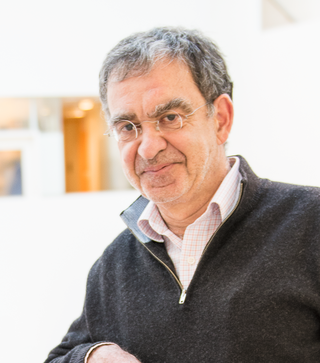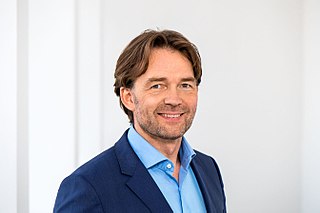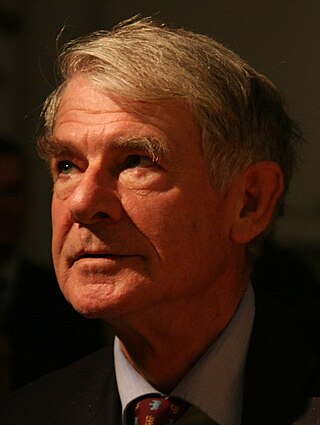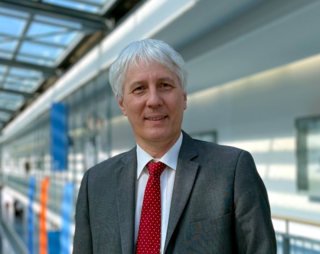Related Research Articles

The Technical University of Munich is a public research university in Munich, Germany. It specializes in engineering, technology, medicine, and applied and natural sciences.

Bert Sakmann is a German cell physiologist. He shared the Nobel Prize in Physiology or Medicine with Erwin Neher in 1991 for their work on "the function of single ion channels in cells," and the invention of the patch clamp. Bert Sakmann was Professor at Heidelberg University and is an Emeritus Scientific Member of the Max Planck Institute for Medical Research in Heidelberg, Germany. Since 2008 he leads an emeritus research group at the Max Planck Institute of Neurobiology.

Ernst Otto Fischer was a German chemist who won the Nobel Prize for pioneering work in the area of organometallic chemistry.

Friedrich Ludwig "Fritz" Bauer was a German pioneer of computer science and professor at the Technical University of Munich.
Hermann Wagner is a German scientist in the field of microbiology and immunology and past Dean of the Medical Faculty of the Technical University Munich (TUM). His massive number of published works, at over 370, makes him one of Europe's most cited immunologists.

Tomaso Armando Poggio, is the Eugene McDermott professor in the Department of Brain and Cognitive Sciences, an investigator at the McGovern Institute for Brain Research, a member of the MIT Computer Science and Artificial Intelligence Laboratory (CSAIL) and director of both the Center for Biological and Computational Learning at MIT and the Center for Brains, Minds, and Machines, a multi-institutional collaboration headquartered at the McGovern Institute since 2013.

Otmar D. Wiestler is a German physician, a professor at the University of Heidelberg and president of the Helmholtz Association. He is not a typical basic scientist, but he successfully entered a number of highly popular fields of clinical research, including cancer research, tumor genetics and, more recently, stem cell research. He focuses on technology transfer of already existing technologies from basic science into clinical use, rather than developing the basic science.

Susanne Albers is a German theoretical computer scientist and professor of computer science at the Department of Informatics of the Technical University of Munich. She is a recipient of the Otto Hahn Medal and the Leibniz Prize.
Georg W. Kreutzberg was a German neuromorphologist. Kreutzberg was long-serving director at the Max Planck Institute of Neurobiology in Martinsried near Munich.
Nancy Jane Kopell is an American mathematician and professor at Boston University. She is co-director of the Center for Computational Neuroscience and Neural Technology (CompNet). She organized and directs the Cognitive Rhythms Collaborative (CRC). Kopell received her B.A. from Cornell University in 1963 and her Ph.D. from Berkeley in 1967. She held visiting positions at the Centre National de la Recherche Scientifique in France (1970), MIT, and the California Institute of Technology (1976).

David Poeppel is Professor of Psychology and Neural Science at New York University (NYU). From 2014 until the end of 2021, he was the Director of the Department of Neuroscience at Max Planck Institute for Empirical Aesthetics (MPIEA). In 2019, he co-founded the Center for Language, Music and Emotion (CLaME) an international joint research center, co-sponsored by the Max Planck Society and New York University. Since 2021, he is the Managing Director of the Ernst Strüngmann Institute.

Peter Hegemann is a Hertie Senior Research Chair for Neurosciences and a Professor of Experimental Biophysics at the Department of Biology, Faculty of Life Sciences, Humboldt University of Berlin, Germany. He is known for his discovery of channelrhodopsin, a type of ion channels regulated by light, thereby serving as a light sensor. This created the field of optogenetics, a technique that controls the activities of specific neurons by applying light. He has received numerous accolades, including the Rumford Prize, the Shaw Prize in Life Science and Medicine, and the Albert Lasker Award for Basic Medical Research.

Matthias H. Tschöp is a German physician and scientist. He is the chief executive officer and scientific director of Helmholtz Zentrum München, German Research Center for Environmental Health. He is also Alexander von Humboldt Professor and chair of metabolic diseases at Technical University of Munich and serves as an adjunct professor at Yale University.
Klaus-Robert Müller is a German computer scientist and physicist, most noted for his work in machine learning and brain–computer interfaces.

Wolf Joachim Singer is a German neurophysiologist.
David W. Tank is an American molecular biologist and neuroscientist who is the Henry L. Hillman Professor in Molecular Biology at Princeton University and the co-director of the Princeton Neuroscience Institute along with psychology professor Jonathan Cohen.
Thomas Frank Hofmann is a German food chemist and academic administrator. Since 2019, he has been President of the Technical University of Munich.

Wolfgang Anton Herrmann is a German chemist and academic administrator. From 1995 to 2019, he was President of the Technical University of Munich.

Alois Christian Knoll is German computer scientist and professor at the TUM School of Computation, Information and Technology at the Technical University of Munich (TUM). He is head of the Chair of Robotics, Artificial Intelligence and Embedded Systems.
Wolfgang P. Baumeister is a German molecular biologist and biophysicist. His research has been pivotal in the development of Cryoelectron tomography.
References
- 1 2 3 4 Konnerth, Arthur. "Curriculum Vitae". Munich Cluster for Systems Neurology. Retrieved 5 January 2019.
- 1 2 3 4 "Arthur Konnerth". Technical University of Munich. Retrieved 5 January 2019.
- ↑ "Prize Winners 2015". The Brain Prize. Archived from the original on 5 January 2019. Retrieved 5 January 2019.
- 1 2 "Arthur Konnerth". The Brain Prize. Archived from the original on 5 January 2019. Retrieved 5 January 2019.
- ↑ "Welcome to the Konnerth Lab". Technical University of Munich. Retrieved 5 January 2019.